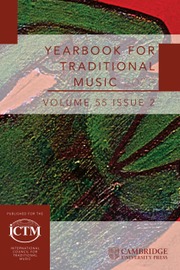Article contents
Yut̲a Manikay: Juxtaposition of Ancestral and Contemporary Elements in the Performance of Yolngu Clan Songs
Published online by Cambridge University Press: 07 March 2019
Extract
Among the earlier views and assumptions about non-Western music that have come to be reconsidered in the present period of musicological self-reflection are those concerning issues of conservatism (or stability) and innovation (or change). In a number of cultural areas, a bias among researchers towards perceived conservatism was influenced by both indigenous and Western beliefs. Clunies-Ross has aptly summarized the bi-cultural impact upon the perception of conservatism in the case of Australian Aboriginal song: “… it is only relatively recently that scholars have begun to question the ideology of stability of songs and their meanings that has been espoused by Aborigines and researchers alike. Two converging ideologies have ensured that the matter remained beyond question. For their part, Aborigines have tended to communicate an ideology of stability to enquiries, and the enquirers have tended to accept this ideology at face value because they have themselves brought to their task prior assumptions about the stability of oral traditions. These assumptions derive from our own culture's emphasis on the unchanging nature of artistic forms, especially of those that have the authority of antiquity” (Clunies-Ross 1987: 4).
- Type
- Articles
- Information
- Copyright
- Copyright © 1992 by the International Council for Traditional Music
Footnotes
Read at the 31st ICTM World Conference in Hong Kong July 1991.
References
References Cited
- 14
- Cited by


